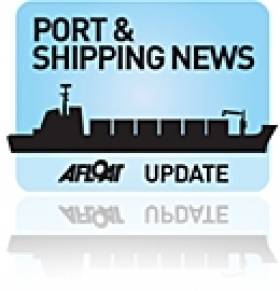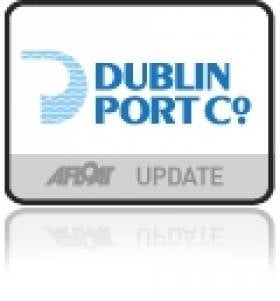Displaying items by tag: Tara Mines
New Arklow Bulker Docks In Dublin to Load at Tara Mines Facility
She has a gross tonnage of 2,998 and a single-box hold with two portable bulkheads which can be placed into 10 positions for cargo separation. At 4,800 dwt, ship is certified for the carriage of dangerous goods of IMO Class 4.1, 4.2, 4.3, 5.1 and 5.2 (packaged) as well as general bulk cargoes. The main engine is a MAN 6L27/38 2040kW gearbox with CPP, delivering about 12 knots.
The 89m Arklow Forest was one of the 4,500 dwt 'R' class designs but was modified to allow carriage of a further 300 tonnes of cargo. She follows Arklow Field (PHOTO) which entered service this year and to read a report on another F class, Arklow Future click HERE.
Arklow Shipping Ltd with its headquarters in Co. Wicklow operate the fleet which in the majority are Irish registered. Some vessels though are managed through Dutch subsidiary Arklow Shipping Netherland B.V. based in Rotterdam where they are also registered in that port.
New €1.5m Rail-Spur for Dublin Port
The minister welcomed "the important investment by Dublin Port Company in its rail network. It will further enhance the attractiveness of the port as a destination for rail-based freight. The project represents a commitment on the part of Dublin Port Company and Iarnród Éireann to customers who want to move goods by rail".
The project took six months to complete and the public private partnership involved Dublin Port Company, Iarnród Éireann and the first customer of the new facility, International Warehousing and Transport (IWT).
IWT is a privately owned Irish logistics company, which already operates freight-trains to Ballina that are expected to increase from 4 to 5 trains per week in each direction as a result of this investment. The rail-operator believes that the service will save up to 5.5million road kilometres annually and reduce CO2 emissions by up to 2,750 tonnes.
The Irish Exporters Association also welcomed the development of the IWT freight operation at the new facility, where increased frequency in services will enhance Ireland's contribution to the European Union's modal shift aspirations from road to rail.
The Common User Terminal is also open to other shipping companies. Existing clients using the lo-lo container terminal operated by Burke Shipping Group through its subsidiary Portroe Stevedores are C2C Lines, APL, Coastal Containers, Evergreen, Gracechurch and OOCL . The terminal also has a ro-ro berth facility where CLdN /Cobelfret operate from on routes to Belgium and The Netherlands.
In addition to the Dublin-Ballina service the port exports 400,000 tonnes of lead and zinc concentrate from the freight customers Boliden/Tara Mines with 15 trains per week. The facility at Alexandra Basin Jetty is regularly served by vessels from Arklow Shipping Ltd, where the 2011 newbuild Arklow Field (2,998 tonnes) is currently berthed.
- Dublin Port
- Dublin Port Company
- Arklow Shipping Ltd
- Irish Exporters Association
- Port of Dublin
- Ports and Shipping News
- IEA
- Minister for Transport
- Ocean Pier
- Irish Rail
- Iarnrod Eireann
- Portroe Stevedores
- Dublin Port news
- IWT
- ASL
- Leo Varadkar T.D.
- Port of Dublin news
- Railfreight
- International Warehousing and Transport
- Alexandra Basin East
- Common User Terminal
- Burke Shipping Group
- Clnd Cobelfret
- Boliden
- Tara Mines
- Arklow Field
- Dublin Shipping
- Lead mines
- Zinc mines
- Irish Railways
- Dublin Port railhead





























































